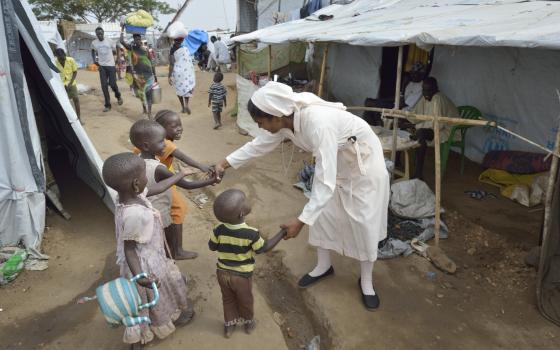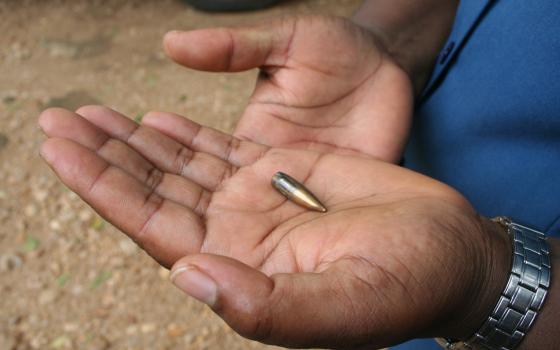In a country effectively at war, incongruities about matters of peace and war are revealing.
Just days before the beginning of Holy Week, I heard an anti-war song – let’s call it an anti-war ballad with rap-like energy – playing on loudspeakers in a courtyard at a Catholic radio station.
While the music played – and it was a good song, with poetic lyrics aimed at young people – a television droned on, with a repeated loop of statements by one of the military commanders of the forces fighting in South Sudan.
No one except me was paying much attention to this broadcast. It was late afternoon, and the afternoon’s quiet languors were settling in: time for everyone to call it a day. What caught my attention was one of the men discussing the nature of war – that from World War II on, it has pretty much been the norm in the world that civilians are killed in war. He said, matter-of-factly, “We did not invent these dynamics of war.”
In a narrow sense, he was right. Warfare has been tilting more and more toward conflicts where civilians are caught up in violence and killing – in the crossfire, so to speak. Africa has experienced a number of such wars. And though there has been hope recently that such conflicts are now on the wane – one recent book about Africa’s future, for example, is optimistically titled The Bright Continent – they do continue in places such as the Democratic Republic of the Congo and the Central African Republic, as well as flaring up now in South Sudan.
Those realities don’t make it any easier to accept war’s intrusion onto the life of the everyday, and the song I heard, a jaunty plea for peace, expressed more of what I had heard from people in two weeks of interviews than anything the commander was saying, or trying to justify. (I am not taking sides here; I am not sure from the brief television snippet if the commander I saw on television was of the Sudan People's Liberation Army, known as the SPLA – the de facto national army – or the rebel forces fighting it. In the end, though, either side would probably say essentially the same thing, which is: “It’s not our fault.”)
What was repeated over and over again in my interviews was the sheer senselessness of what is happening in South Sudan – by all accounts, a political dispute trickling into the nation’s army barracks, turning ugly when ethnic loyalties entered the mix, and then turning combustible and lethal. The result: thousands, even tens of thousands, dead; hundreds of thousands displaced; and entire neighborhoods, even cities, destroyed.
What led to the turmoil, the tension between, and grievances among, the Nuer and Dinka ethnic groups, may be grounded in the particular realities of South Sudan. But the players, especially the politicians and military figures, could be drawn from the pages of Shakespeare.
And hearing the experiences of the clergy and religious who survived the destruction of the city of Malakal in the northeast Upper Nile State, where looting and the raping and the killing of civilians (even those in hospital beds) occurred before the city was deserted, brought to mind that oft-quoted line from the Roman historian Tacitus: "They make a desert and call it peace."
Both men and women expressed dismay about what happened in Malakal (or the streets of Juba, for that matter), but one of the Catholic sisters I met on my assignment told me that women in particular are angered and dismayed over this course of events. “The women say, ‘We have no hope with the men because they always want to fight,’” said Sr. Amala Francis, who is the project coordinator for the Juba-based ministry of the Daughters of Mary Immaculate.
I had several good conservations while in South Sudan with religious, both women and men, about their thoughts on evil, and there have long been debates about gender and war. There are good arguments either way that war is about something inherently violent within us or is something “constructed” and embraced primarily (though not exclusively) by men.
I can say that Francis’s observation about men and war was a common one, and that the practical solution many suggested had less to do about changing human nature than improving South Sudan’s economy so that aimless young men who fight in armed groups and do little but loot, rape and kill can find gainful work and a purpose in their lives that doesn’t revolve around violence.
“To imagine a better life, you have to see it, you have to be exposed to it,” said Lorraine Bramwell, the country director for Catholic Relief Services, citing the need for sustained international support for building South Sudan’s schools, infrastructure and health facilities.
That will take time – and unfortunately, in the meantime, the violence that people have experienced remains a part of their lives. Call it trauma. Searing trauma. Lived and felt trauma. Trauma that doesn’t let go of your mind, trauma that causes you to replay over and over again acts of violence, hatred and cruelty.
“The wounds are exposed,” said Sr. Lorena Morales, a Costa Rican Comboni missionary who, along with others who worked in the Malakal diocese, was evacuated and now temporarily living in Juba. “We carry the wounds in our hearts, in our memories.”
People in Juba told me of being pinned down in their homes because of skirmishes in their streets and alley ways when violence erupted right before Christmas.
Sr. Anne Kiragu of the Daughters of St. Paul showed me the bullets she had picked up from the yard outside the home she shares with others in her order.
“The bullets were flying even here,” she said in the yard of her small compound, where a statue of Mary stands guard. “There were days of shooting, shooting, shooting.” Some in her order left Juba – though they eventually plan to be back. Nonetheless, security worries remain a constant, and no one Kiragu knows, either in or outside the religious community in South Sudan, has any interest in testing further the limits of living amid more violence.
“We don’t look to be martyred,” she said.
At the least, one of the things that the communities of religious want to do is offer a witness to what they have seen – a witness that has particular resonance during the Easter season.
“We are alive and there is hope, a chance for a new beginning,” Morales told me, adding that the confusion dispersed communities of faith may be experiencing now is comparable to what the early followers of Jesus experienced in the confusion following his death.
“They scattered after Jesus died, they wandered and got confused but eventually felt the presence of God in their community,” she said. “They found a meaning for a new life, a new hope.”
Her hope for Easter 2014?
“A new genesis for South Sudan.”
Good lessons. But the hope of Easter may be short-lived. “It’s going to be a war of attrition,” one long-term observer of South Sudan told me.
In other words, peace ballads may still be pleading for peace in a year’s time. But don’t be surprised if military commanders take to the airwaves to repeat the subtle justification that, “We didn’t invent war or the loose rules of war these days.”
One last story. After leaving the radio station that afternoon, I saw an uncle of a young woman I had interviewed the day before. Agunya Lengson Oyat told me that he didn’t feel well. “My body is on fire,” he said. What he meant was that he had come down with symptoms of malaria. As he sipped strong, black coffee, he shook his head in frustration.
I’m not a pacifist, but after this assignment, I have increased respect for those who are. A country like South Sudan, where people routinely come down with malaria, should not be at war. It has too many other things to worry about.
[Chris Herlinger is a contributing writer to NCR on humanitarian and international issues, an author and the senior writer for Church World Service.]
GSR South Sudan reports by Chris Herlinger - Women hold society together amid war and
The voice of constant motion: Sr. Anne Kiragu
On NCRonline.org - In South Sudan, 'everything they are doing, they are doing with tears'






